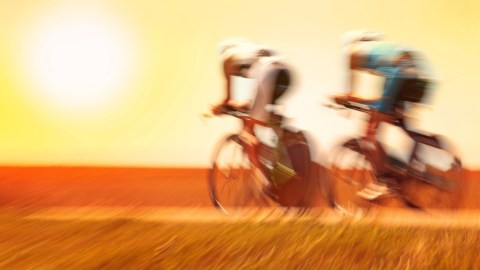Trick Your Body into Going Faster
There is a reserve of extra performance that the body can be tricked into accessing in competition.

Sign up for Big Think on Substack
The most surprising and impactful new stories delivered to your inbox every week, for free.
This article originally appeared in the Newton blog on RealClearScience. You can read the original here.
Can you run faster when you chase someone? The intuitive answer, of course, is yes. But, if you carefully timed yourself under controlled conditions, would it hold true? A study conducted by British researchers specializing in sports and exercise sciences finds the answer: competition can in fact drive athletes to go faster than otherwise possible. More surprising, the study also finds that extra performance can be wrung out of the body if the brain is deceived about that competition.
A cycling “time trial” of 4000 meters was chosen as the performance test. Riders competed alone against the clock to complete the distance in the fastest possible time. The roughly 2.5-mile course is simulated on stationary bikes to minimize outside variables such as wind, weather and unforeseen road conditions. Strategy is simple: attempt to find the very highest possible pace that can be held steadily for the entire duration.
Very fit amateur cyclists were chosen as study subjects. (For athletics nerds: The subjects’ average VO2 max — which measures athletic fitness by determining how much oxygen is consumed by the body — was roughly 65 mL/kg/min, which falls between that of an average young to middle-aged man at roughly 40 mL/kg/min and a Tour de France-winning cyclist who might be 85 mL/kg/min.) Since running, cross-country skiing, rowing, and other timed events follow similar strategies, the results should apply broadly to athletes in all these highly aerobic sports.
Each cyclist rode four time trials. The first trial allowed them to become familiarized with the stationary machine and a simulated course video projected in front of them. The second trial was an all-out effort to measure their maximum performance on the course with no opponent. For the third and fourth trials, the cyclists were shown a simulated opponent on the course. Riders were told that their imaginary opponents exactly matched their previous best performance. What the participants didn’t know was that the fourth trial was actually a trick; the simulated opponent was in reality 2% faster.
Racing against an equal opponent in the third trial, cyclists were faster than their previous best times. So, the presence of an equal opponent coaxed a greater performance out of the athletes, allowing them to better their speed.
More intriguingly, the cyclists performed better still when chasing the souped up version of themselves, despite being unaware that the opponent was faster. Seeing the simulated back of the person in front of them drew out some extra performance from the subjects, but being tricked about that opponent’s ability made them perform better still. The conclusion: you can reach a better level of performance when you are chasing someone who is going faster than you realize you can normally go.
This led the researchers to conclude that there is a reserve of extra performance that the body can be tricked into accessing in competition, but only when the brain doesn’t realize that it is sending the body past its normal absolute maximum level of exertion.
So, next time you go out to train, bring a buddy who is a little faster than you. Your brain will trick you into working even harder.
Source: Mark Robert Stone, Kevin Thomas, Michael Wilkinson, Andrew M. Jones, Alan St Clair Gibson, Kevin G. Thompson, Effects of Deception on Exercise Performance: Implications for Determinants of Fatigue in Humans Med Sci Sports Exerc. 2012 Mar; 44(3) p. 534
Image courtesy of Shutterstock
Sign up for Big Think on Substack
The most surprising and impactful new stories delivered to your inbox every week, for free.





